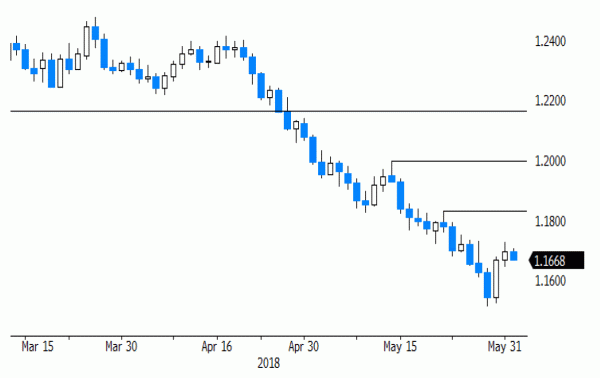Rates: Focus on US eco data as Italian political deadlock ends?
The Italian political deadlock ended yesterday evening with a new government sworn in today. We don’t expect a strong relief rally as last week revealed vulnerabilities of (peripheral) government bond markets. Attention could shift to US eco data today with the June 13 FOMC meeting already in mind. The escalating trade conflict is a wildcard.
Currencies: Easiest part of euro rebound behind US?
Yesterday, EUR/USD rebounded temporary to 1.17, but the move stalled. We don’t expect much further support for the euro from the installation of a new government. US Payrolls might be mixed for the dollar. A further flaring up of the trade tensions might weigh slightly more on the euro than on the dollar.
The Sunrise Headlines
- US markets lost ground yesterday with the Dow Jones underperforming (-1%). Asian stock markets are mixed overnight with China underperforming. The Caixin manufacturing PMI stabilized at 51.1 in May.
- Italy’s 5SM and the far-right Lega clinched the approval of president Mattarella for the launch of a populist government, all but ending a political crisis that has gripped the country for nearly 3 months and spooked investors. (FT)
- David Davis is devising a new Brexit plan to break a talks deadlock by giving Northern Ireland joint EU and UK status as well as a border buffer zone so it can trade freely with both. (The Sun)
- Spain’s Socialists have enough votes to oust PM Rajoy in a no-confidence vote set for today and replace him with party leader Pedro Sanchez. Reports were denied that Rajoy will resign to avoid defeat, thereby triggering elections. (BB)
- Fed Brainard suggested a policy path that moves gradually from modestly accommodative to neutral and, afterwards, modestly beyond neutral, consistent with sustaining strong labor market conditions and inflation around target.
- Canada and Mexico retaliated against the US decision to impose tariffs on steel and aluminum imports and the EU had its own reprisals ready to go, reigniting investor fears of a global trade war. (Reuters)
- Today’s eco calendar contains US payrolls, unemployment rate, average hourly earnings and the manufacturing ISM (US) / PMI (UK). Fed Kaplan and Kashkari speak.
Currencies: Easiest Part Of Euro Rebound Behind US?
Easiest part of EUR/USD rebound behind us
EUR/USD rebounded north of 1.17 yesterday as Italian-related tensions eased further, but the risk on trade petered out. A sharp rise in EMU inflation opened the door for the ECB to reduce its APP programme later this year. For now it didn’t help the euro. US data were good, but near expectations. Later, the US imposed tariffs on steel and aluminium from Canada, Mexico and the EU. There was no unequivocal reaction in global FX. EUR/USD settled in the upper half of 1.16. USD/JPY fell temporary, but closed the session little changed (108.82). The Canadian dollar reversed most of Wednesday’s post-BoC gains.
Asian markets are trading mixed this morning. The reaction to the rising trade tensions remain modest. The BOJ reduced buying of 5 and 10-y bonds in its regular operation (probably as it wants a slightly steeper yield curve). Interesting, the BOJ shift this time didn’t trigger any speculation on a more profound change in BOJ policy further down the road. The yen even declined slightly. USD/JPY rebounded north of 109. EUR/USD is losing a few ticks, indicating some cautious USD bid.
European investors will look for clues on what the policy of the new US government will mean for the budget and what position will take vis-à-vis the EU. After the recent relief rally, we expect investors to take some wait-and –see approach. It might be too soon for further euro gains on Italy. In the US, job growth is expected to rebound from 164K to 190K. A positive surprise might not be that evident. However, AHE (wages) might be at least as important as payrolls growth. For this indicator, consensus expectation (0.2% M/M) is not too high. Even so, it might not be that evident for the payrolls to raise market expectations on a more aggressive Fed at the June meeting. The impact of the trade tensions for global FX trading is diffuse. We hold the working hypothesis that it might be slightly negative for EUR/USD, but maybe also for USD/JPY. From a technical point of view, EUR/USD rebounded off the 1.1510/50 area, but didn’t regain any key technical level. We are not convinced on a protracted euro rebound yet. 1.1830 is first resistance ahead of the 1.1996/1.20 area which we consider not easy to break.
EUR/GBP drifted north yesterday, supported by the EUR/USD rebound. The manufacturing PMI is expected to ease slightly to 53.5 today. A big positive surprise is probably needed to support sterling. We expect sterling to remain relatively weak,
EUR/USD rebound slows ahead of first resistance

